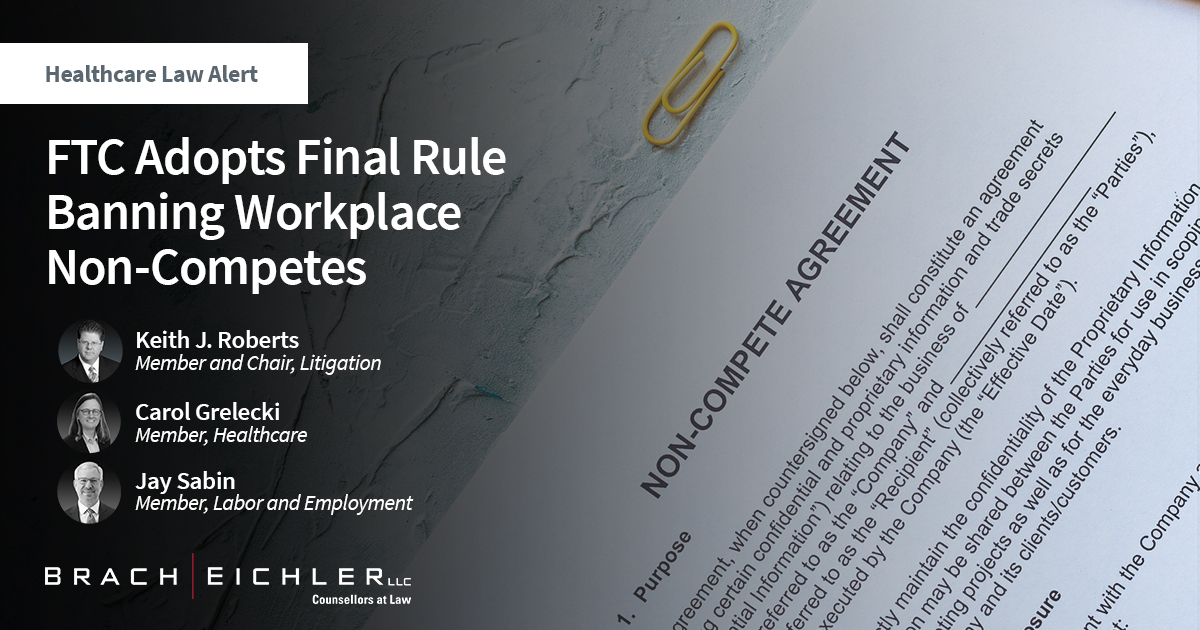FTC Adopts Final Rule Banning Workplace Non-Competes

April 24, 2024
The Federal Trade Commission on April 23, 2024 adopted a broad regulation that will void employer contracts, workplace policies, and compensation arrangements that prohibit, penalize, or in practice prevent a worker from working elsewhere (save for a few limited exceptions) when – and if – the ban goes into effect as scheduled in mid-August 2024. This alert highlights the primary questions that an organization must answer to determine whether and to what extent the ban applies. The firm will be presenting a webinar on May 9, 2024 at 1 p.m. describing the rule in greater detail and sharing practical recommendations how businesses can prepare.
Is My Organization Subject to the FTC Rule?
A private sector, for-profit business is subject to the FTC rule. However, not all non-profit organizations are subject to the FTC rule because the FTC has jurisdiction only over statutory “corporations.” In issuing its rule, the FTC cautioned that “that not all entities claiming tax-exempt status as nonprofits fall outside the [FTC’s] jurisdiction. . . . Merely claiming tax-exempt status in tax filings is not dispositive.” The FTC cited, for example, its prior exercise of jurisdiction “over an independent physician association claiming tax-exempt status as a nonprofit.” Nonprofit organizations therefore will have to conduct a detailed analysis of the scope of the FTC’s jurisdiction.
Is the Person Providing Services Covered by the FTC Rule?
Any person who provides services to a regulated organization is covered, even if the person is treated as an independent contractor or is a sole proprietor. However, the rule does not apply to franchisees in the context of a franchisor-franchisee relationship.
Is the Contract, Policy, or Compensation Arrangement Covered?
The FTC rule applies only to limitations on a worker’s ability to work elsewhere after the current engagement. It does not apply to limitations on concurrent employment, such as a policy that prevents or limits moonlighting.
Is a Contract, Policy, or Compensation Arrangement a “Non-Compete”?
The FTC rule applies to more than just contracts that prohibit working elsewhere. The rule also applies to any policy or arrangement that “penalizes” a worker from working elsewhere or that “functions to prevent a worker from” working elsewhere. Deferred compensation arrangements that condition the payment of compensation on the person not working elsewhere will be considered a non-compete. Similarly, certain employee loans and advances may be considered non-competes, as may be overly broad non-solicitation and confidentiality agreements.
Is the Non-Compete Banned?
The FTC rule bans all non-competes, with two general exceptions. First, the rule does not ban a non-compete in existence as of mid-August 2024 with a worker “in a policy-making position” who received total compensation of at least $151,164 in the preceding year. Not all salaried executives will fall within this exception. The worker will need to be
- The organization’s president, CEO “or the equivalent”; or
- Another officer (such as a “vice president, secretary, treasurer or principal financial officer, comptroller or principal accounting officer”) “with policy-making authority”; or
- A person with “policy-making authority . . . similar to an officer with policy-making authority.”
“Policy-making authority” for purposes of this exception “means final authority to make policy decisions that control significant aspects of a business entity or common enterprise.” Applying this exception to closely-held organizations, such as a limited liability medical practice, will require careful analysis of the actual business functions of each manager and equity holder. This exception does not apply to non-competes entered into after mid-August.
Second, the ban does not apply when “entered into by a person pursuant to a bona fide sale of a business entity, of the person’s ownership interest in a business entity, or of all or substantially all of a business entity’s operating assets.” The exception applies even if the person sells only a minority stake in the business and regardless of the financial size of the transaction.
What to Do if an Existing Non-Compete is Banned?
An organization cannot seek to enforce a banned non-compete and must provide the person subject to the non-compete with written notice of its unenforceability by mid-August 2024. The rule permits, but does not require, that the notice be in a language other than English.
What to do if a Pre-Existing Non-Compete Was Violated?
If a worker violated a non-compete before the mid-August effective date of the rule, an organization may pursue litigation to enforce the non-compete and obtain damages, at least according to one reading of the rule. (Nonetheless, businesses should obtain specific legal advice before bringing suit.)
Is the Rule Enforceable?
At least one lawsuit has been filed to enjoin the rule, with many more expected. The U.S. Chamber of Commerce, for example, announced on April 23 its intent to sue. Organizations should monitor the status of these lawsuits, as no particular outcome is a certainty.
The firm will explore the FTC non-compete rule in detail at its webinar on May 9, 2024 at 1:00pm.
For more information about the issues raised in this Alert, please contact:
Keith J. Roberts, Esq., Member, Chair, Litigation Practice, at kroberts@bracheichler.com or 973-364-5201
Carol Grelecki, Esq., Member, Healthcare Practice, at cgrelecki@bracheichler.com or 973-403-3140
Jay Sabin, Esq., Member, Labor and Employment Practice, at jsabin@bracheichler.com or 917-596-8987
Related Practices: Healthcare Law, Litigation, Labor and Employment
Related Attorney: Keith J. Roberts, Carol Grelecki, Jay Sabin
Related Industry: Healthcare














